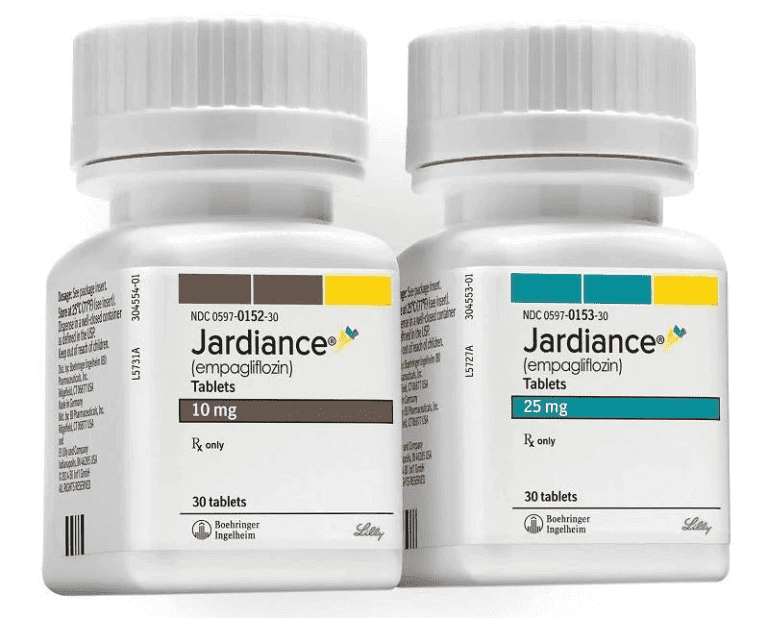Farxiga is an FDA-approved prescription drug (Food and Drug Administration) used for the treatment of type 2 diabetes mellitus, chronic kidney disease (CKD) and heart failure.
Farxiga has also been found to have an impact on weight management for those individuals with type 2 diabetes. This article will give you a better understanding of this drug and compare Farxiga with other diabetes medications.
Understanding Farxiga and its role in weight management
Farxiga (dapagliflozin) is an SGLT2 inhibitor, that works by blocking the reabsorption of glucose in the kidneys, increasing the elimination of glucose through urine. Here’s how Farxiga contributes to weight management.
- Farxiga helps with the removal of excess glucose from the bloodstream, resulting in a loss of around 300 calories, which aids in weight reduction
- Farxiga influences the metabolism of fat by helping the body convert stored fat into energy. This process not only supports weight loss, but also helps to maintain energy levels throughout the day
- Farxiga may influence appetite and food intake, potentially reducing hunger, which further contributes to weight loss by reducing the consumption of calories
This highlights Farxiga’s dual role in managing both blood sugar levels and body weight, making it a useful treatment option for patients with type 2 diabetes and obesity.
Does Farxiga cause weight loss?
Several clinical studies provide information on the speed and extent of weight loss with Farxiga:
- In clinical trials, the most significant fat loss starts around six weeks after starting treatment and can continue for about six months. The most rapid weight loss with Farxiga can begin as rapidly as three days after starting the medication, primarily due to fluid loss
- Farxiga consistently shows a weight reduction over longer periods. A 2019 review highlighted that users taking Farxiga in combination with metformin lost about 5 pounds over six months
- Comparing Farxiga with other diabetes medications, such as Mounjaro (tirzepatide), reveals that Mounjaro users might experience an average weight loss of 41 pounds over 72 weeks. Farxiga users generally lose about 3-5 pounds in the same duration when used alongside metformin
Farxiga versus other diabetes medications for weight loss
Here is a brief comparison of Farxiga versus other weight loss medications:
- Farxiga vs. Jardiance: These medications are both SGLT2 inhibitors that reduce blood sugar levels and aid weight loss. They are available in different strengths, with Farxiga at 5 mg and 10 mg, and Jardiance at 10 mg and 25 mg. Both have common side effects like urinary tract infections (UTIs) and genital yeast infections. Jardiance has shown additional benefits among patients with heart disease and cardiovascular risk
- Farxiga vs. Ozempic: These medications belong to different drug groups. Farxiga is an SGLT2 inhibitor, whereas Ozempic (semaglutide) is a glucagon-like peptide-1 (GLP-1) receptor agonist. There is no direct comparison currently available regarding weight loss between these two drugs
- Farxiga and metformin combination: Research has shown combining Farxiga with metformin can significantly enhance weight loss outcomes, reporting losses of up to 10 pounds over six months compared to those on a placebo
Lifestyle changes with any medication, such as a balanced healthy diet and regular physical activity can boost the benefits and lead to better overall well-being and more effective weight management.
Conclusion
Farxiga not only controls blood glucose levels, but also supports weight reduction through processes such as glucose elimination, fat metabolism, and appetite regulation. Its consistent weight loss results over time, particularly when used jointly with metformin, enhances its effectiveness.
Farxiga may not be right for you if you have certain medical conditions, so always consult with your healthcare provider for medical advice about your prescription medications including any over-the-counter treatments and supplements you may be taking.
Sources
- Dapagliflozin Reduces Fat Mass without Affecting Muscle Mass in Type 2 Diabetes – NCBI
- Common questions about dapagliflozin – NHS
- GLP-1 agonists: Diabetes drugs and weight loss – Mayo Clinic
Medical Disclaimer
NowPatient has taken all reasonable steps to ensure that all material is factually accurate, complete, and current. However, the knowledge and experience of a qualified healthcare professional should always be sought after instead of using the information on this page. Before taking any drug, you should always speak to your doctor or another qualified healthcare provider.
The information provided here about medications is subject to change and is not meant to include all uses, precautions, warnings, directions, drug interactions, allergic reactions, or negative effects. The absence of warnings or other information for a particular medication does not imply that the medication or medication combination is appropriate for all patients or for all possible purposes.
Related Articles
How does Farxiga lead to weight loss?
Farxiga is classified as a sodium-glucose cotransporter 2 (SGLT2) inhibitor. It aids in weight loss by expelling excess glucose from your bloodstream.
Can you explain how dapagliflozin facilitates weight loss?
Dapagliflozin promotes weight loss primarily by increasing the amount of glucose excreted in the urine. This process can lead to a reduction in body fat due to calorie loss and may also result in fluid loss through osmotic diuresis. Both of these effects contribute to weight reduction.
What is the typical weight loss observed with dapagliflozin?
According to systematic reviews and meta-analyses, dapagliflozin lowers systolic blood pressure by approximately 4-5 mmHg and results in an average weight loss of about 1.7 kg.
How will I know if Farxiga is effective?
You may begin to see Farxiga’s effects from the first dose, although it could take a few weeks for noticeable improvements in your blood sugar levels. The duration it takes for Farxiga to reduce the risk of heart failure or kidney disease complications is currently undetermined.










